Phylum Arthropoda (Arthropods) ➔ Subphylum Hexapoda (Hexapods) ➔ Class Insecta (Insects) ➔ Order Hymenoptera (Sawflies, wasps, ants, bees) ➔ Family Braconidae (Braconid wasps)
Dinocampus coccinellae (Schrank, 1802)
Marienkäfer-Brackwespe
Synonyms and other combinations:
Ichneumon coccinellae Schrank, 1802 | Dinocampus americanus (Riley, 1888) | Dinocampus sculptus (Cresson, 1872) | Dinocampus terminatus (Nees, 1811) | Perilitus coccinellae Schrank, 1802 |
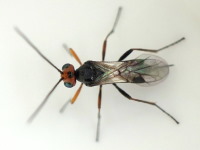
Dinocampus coccinellae (Schrank, 1802)
Marienkäfer-Brackwespe
Dinocampus coccinellae, female
DE, Chemnitz, Stadtpark; 2015-07-27 12:05:43
Image number: 7106
female
DE, Chemnitz, Stadtpark
2015-07-27 12:05:43
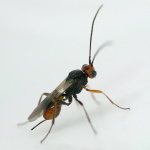
Dinocampus coccinellae (Schrank, 1802)
Marienkäfer-Brackwespe
Dinocampus coccinellae, female
DE, Chemnitz, Stadtpark; 2015-07-27 12:11:17
Image number: 7107
female
DE, Chemnitz, Stadtpark
2015-07-27 12:11:17
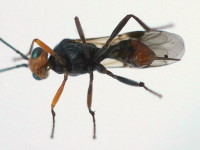
Dinocampus coccinellae (Schrank, 1802)
Marienkäfer-Brackwespe
Dinocampus coccinellae, female
DE, Chemnitz, Stadtpark; 2015-07-30 17:50:31
Image number: 7108
female
DE, Chemnitz, Stadtpark
2015-07-30 17:50:31
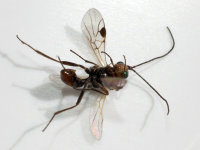
Dinocampus coccinellae (Schrank, 1802)
Marienkäfer-Brackwespe
Dinocampus coccinellae, female
DE, Chemnitz, Stadtpark; 2018-08-26 13:50:15
Image number: 8494
female
DE, Chemnitz, Stadtpark
2018-08-26 13:50:15
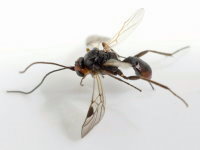
Dinocampus coccinellae (Schrank, 1802)
Marienkäfer-Brackwespe
Dinocampus coccinellae, female
DE, Chemnitz, Stadtpark; 2018-08-26 13:54:22
Image number: 8495
female
DE, Chemnitz, Stadtpark
2018-08-26 13:54:22
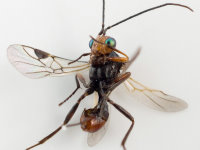
Dinocampus coccinellae (Schrank, 1802)
Marienkäfer-Brackwespe
Dinocampus coccinellae, female
DE, Chemnitz, Stadtpark; 2018-08-25 10:33:13
Image number: 8496
female
DE, Chemnitz, Stadtpark
2018-08-25 10:33:13
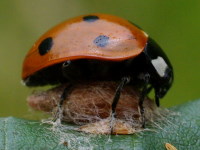
Dinocampus coccinellae (Schrank, 1802)
Marienkäfer-Brackwespe
Coccinella septempunctata + Dinocampus coccinellae, cocoon
DE, Chemnitz, Hutholz; 2008-07-12 13:53:56
Image number: 2710
cocoon
DE, Chemnitz, Hutholz
2008-07-12 13:53:56
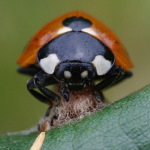
Dinocampus coccinellae (Schrank, 1802)
Marienkäfer-Brackwespe
Coccinella septempunctata + Dinocampus coccinellae, cocoon
DE, Chemnitz, Hutholz; 2008-07-12 13:52:49
Image number: 2711
cocoon
DE, Chemnitz, Hutholz
2008-07-12 13:52:49
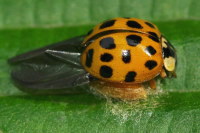
Dinocampus coccinellae (Schrank, 1802)
Marienkäfer-Brackwespe
Harmonia axyridis + Dinocampus coccinellae, cocoon
DE, Chemnitz, Stadtpark; 2015-07-19 15:58:28
Image number: 7100
cocoon
DE, Chemnitz, Stadtpark
2015-07-19 15:58:28
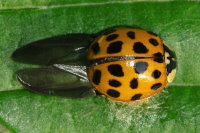
Dinocampus coccinellae (Schrank, 1802)
Marienkäfer-Brackwespe
Harmonia axyridis + Dinocampus coccinellae, cocoon
DE, Chemnitz, Stadtpark; 2015-07-19 15:58:54
Image number: 7101
cocoon
DE, Chemnitz, Stadtpark
2015-07-19 15:58:54
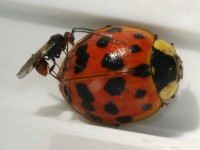
Dinocampus coccinellae (Schrank, 1802)
Marienkäfer-Brackwespe
Dinocampus coccinellae
DE, Chemnitz, Stadtpark; 2015-07-30 09:43:31
Image number: 7102
DE, Chemnitz, Stadtpark
2015-07-30 09:43:31
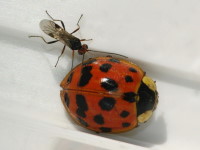
Dinocampus coccinellae (Schrank, 1802)
Marienkäfer-Brackwespe
Dinocampus coccinellae
DE, Chemnitz, Stadtpark; 2015-07-30 09:43:51
Image number: 7103
DE, Chemnitz, Stadtpark
2015-07-30 09:43:51

Dinocampus coccinellae (Schrank, 1802)
Marienkäfer-Brackwespe
Dinocampus coccinellae
DE, Chemnitz, Stadtpark; 2015-07-30 09:43:42
Image number: 7104
DE, Chemnitz, Stadtpark
2015-07-30 09:43:42
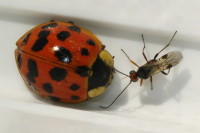
Dinocampus coccinellae (Schrank, 1802)
Marienkäfer-Brackwespe
Dinocampus coccinellae
DE, Chemnitz, Stadtpark; 2015-07-30 09:44:07
Image number: 7105
DE, Chemnitz, Stadtpark
2015-07-30 09:44:07
Classification:
Dinocampus coccinellae belongs to the subfamily Euphorinae.
Distribution:
Europe, Asia, North Africa, North America, Australia.
Habitat:
Wherever ladybirds live, which are suitable as hosts for the larvae of
Dinocampus coccinellae.
Description:
Length 3 to 4 mm; head brownish yellow; antennae long and slender with 21 to 23 segments; thorax black, stout, about as broad as the head; abdomen and thorax of equal length; wings transparent with brown stigma and veins.
Biology:
The braconid
Dinocampus coccinellae is a parthenogenetic species. The offspring develop from unfertilized eggs and are all female.
The females of
Dinocampus coccinellae look for adult, preferably female ladybirds to deposit their eggs. If no adult beetles can be found, the eggs are also deposited into larger larvae or pupae. A few days later larvae emerge from the eggs. The freshly hatched 1st instar larvae have special mouth parts with which they can remove possibly existing further eggs or larvae. In a beetle, usually a single larva develops further. This feeds on body fluids and fatty tissue and spares the vital organs of the host. Later, the adult larva leaves the paralyzed, living beetle. The larva builds a pupation cocoon between the legs of the paralyzed ladybird. Paralysis is probably caused by an RNA virus transmitted by the
Dinocampus coccinellae. The beetle with its warning colouring serves the
Dinocampus pupa as protection against predators. After the wasp has hatched, a small part of the ladybirds recover.
Dinocampus coccinellae parasitizes a variety of ladybird species of the subfamily Coccinellinae. A common host is the Seven-spot Ladybird (
Coccinella septempunctata).
Hosts of the two
Dinocampus coccinellae specimen shown here were Harlequin Ladybirds (
Harmonia axyridis). The 2018 beetle still survived a few days after the wasp hatched. The 2015 beetle was less fortunate.
Natural enemies:
Gelis agilis (Hymenoptera, Ichneumonidae, Cryptinae) - a generalist and hyperparasitoid.
The wingless females of
Gelis agilis oviposit into
Dinocampus coccinellae cocoons.
References, further reading, links:
- Dicky S. Yu, Kees van Achterberg & Klaus Horstmann: World Ichneumonoidea 2011, Taxapad 2012
- C. van Achterberg: Illustrated key to the subfamilies of the Braconidae (Hymenoptera: Ichneumonoidea), Zoologische Verhandlungen 283 (1993) 3-189.













